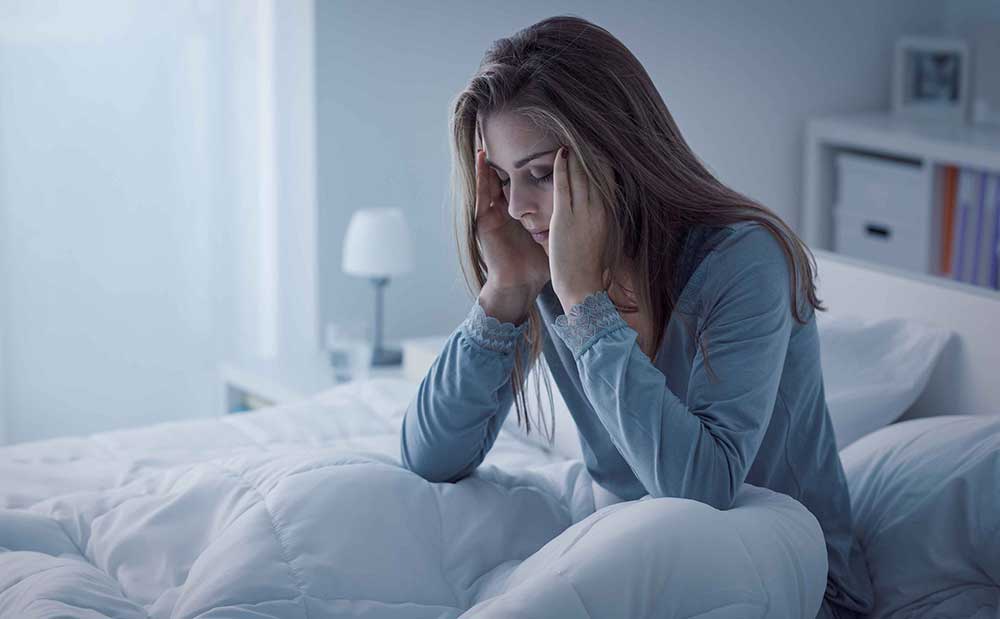
Stress and sleep have been mortal enemies since the dawn of time. Whether our ancient ancestors were worried about collecting or catching enough food or you’re currently losing sleep fixating on your bills…it’s hard to get good rest when you’re stressed. (1) Turns out sleep and stress may connect more closely than you even know.
Read on to find out all the juicy details: how stress and sleep push each other around, how our stress has developed over the years, and what you can do to manage your stress and snooze the night away.
Note: The content on Sleepopolis is meant to be informative in nature, but it shouldn’t be taken as medical advice, and it shouldn’t take the place of medical advice and supervision from a trained professional. If you feel you may be suffering from any sleep disorder or medical condition, please see your healthcare provider immediately.
Long Story Short
- When you get stressed, your body elevates your heart rate, enhances your breathing, eyesight, and focus, and generally amps you up…none of which make for good sleep.
- You can tamp down your stress by practicing mindfulness, breathing exercises, journaling, yoga, and good sleep hygiene.
- Research shows we’re more stressed than ever, but we also have more tools to help us combat those vibes and get better rest.
How Stress and Sleep Are Connected
When stress and sleep start butting heads, your physical symptoms can escalate quickly. Let’s look at how exactly this works.
Your Body’s Stress Response
Back in the days before we lived in (relative) safety, our bodies learned to respond to perceived threats by activating a few systems. When we get stressed, our sympathetic nervous system activates the “fight or flight” response, flooding our bloodstream with epinephrine and norepinephrine, which are two neurotransmitters (brain messengers) that get your body ready to fend off an attacker or run to safety. (2)
These messengers make your heart race, and your breathing speeds up to get you more oxygen in a hurry. They also temporarily sharpen your eyesight and focus, making you feel hyper-aware of your surroundings. (2) (3) Then another system called the hypothalamic–pituitary–adrenal (HPA) axis kicks in to help you keep up this heightened state a bit longer. (4) You might recognize how stress feels in the short-term — remember the first time you had to give a speech in front of your class or co-workers? — but long-term stress can also manifest as pain, fatigue, weight gain, chest pains, and more. (2) (5) (6)
Both your fight-or-flight response and the HPA axis work really well to keep you alive in dangerous situations. But if you try to fall asleep while these systems are in “go-mode,” your body’s going to say, “Why are you sleeping? It’s time to run!” (5)
In fact, a 2023 poll from Gallup shows that 63 percent of Americans who report wanting more sleep say they frequently experience stress, compared with 31 percent of those who get the sleep they need. (8)
Short-term stress effects can disrupt any given night of sleep, but stress that lasts a long time or keeps coming back can lead to sleep disorders and other medical problems, including the ones we mentioned above. (2) (9) Keep reading for some stress solutions!
The Circular Stress-Sleep Pattern
“Stress at night can trigger a vicious cycle where the stress response prevents you from getting restful sleep, which then leaves you fatigued and more vulnerable to stress the next day,” says Dr. Chester Wu, M.D., sleep medicine physician in Houston, TX. (1)
When you’re stressed, you can get stuck in a pattern of rumination — or fixated thinking about negative feelings — which directly affects sleep. (7) Rumination can also lead to depression and anxiety, two more notorious sleep-stealers. (10)
Sleep and Emotional Stress
“I like to say that sleep is an emotional experience,” says Dr. Audrey Wells, M.D., sleep physician and founder of Super Sleep MD. “In order to achieve sleep, you have to have a low amplitude emotion that is neutral or slightly positive.” You need to feel comfortable, contented, safe, and like you’ve done enough for the day, Wells adds.
(If you’re laughing or crying after reading that, stick with us…solutions are coming!)
On the flip side, if you feel pressured, stressed, or maybe you’re going through a big change, the ensuing emotions will compete with sleep, says Wells. (1)
Risks of Stress-Induced Sleep Deprivation
Sleep touches just about every part of your body, and you need seven to nine hours of it every night to handle any stress coming at you and to function at your best. (1) (11) “Sleep deprivation impairs your brain’s ability to regulate emotions effectively, making it harder to handle daily stressors,” says Wu.
Wells agrees, adding, “the way a person sleeps night after night, year after year will define the way they spend the last 10 years of their life.” Long-term sleep deprivation can lead to health conditions like: (12)
Sleep deprivation puts stress on both your body and brain, says Wells, and no one is immune to its effects.
How to Reduce Stress for Better Sleep
Now here’s the good part: some answers to your sleep-stress woes. To reduce your stress for better sleep, you must calm down the two systems we talked about above, says Wu: your HPA axis and sympathetic nervous system. (15)
Not only can these techniques calm your nervous system for that night of sleep, but, done over time, they can train your brain so your stress is actively managed all the time, says Wells. (16)
Practice Mindfulness
Practicing mindfulness involves quietly observing how you feel and what you’re thinking without judgment, focusing on the present moment. (17) (18) Experts have even found that mindfulness can decrease the effects of stress and anxiety, sometimes just as well as medication. (19)
You can practice mindfulness in all sorts of ways. Here are some ideas to get you started: (20)
- Focus on your senses: Sit somewhere comfortable and take a moment to note what you feel, hear, see, smell, and taste.
- Say one nice thing about yourself: What do you like about yourself today?
- Just breathe: Close your eyes and focus on your breaths. Slow them down little by little and notice how the air feels flowing in and out of your lungs.
Implement Breathing Exercises
We cheated a little and got started on breaths in the last section, but breathing exercises can suck the stress out of a lot of different situations. Focused deep breathing sessions done over five minutes or more on a regular basis are the most effective. (21) You can try out one or two of these and see if any feel right for you: (22) (23)
- Pursed lip breathing: Breathe in slowly through your nose, then exhale gently through pursed lips, like you’re blowing out birthday candles. Bonus points if you can make the exhale last twice as long as the inhale!
- Box breathing: Breathe in for four seconds, hold for four seconds, breathe out for four, hold for four, then repeat.
- 4-7-8 breathing: Breathe in for four seconds, exhale for seven seconds, hold for eight seconds, and repeat.
These also work great for night-waking. “If you wake up in the middle of the night and you have these tools in your toolbox…you can now engage with them to get back to sleep easier,” says Wells.
Try Journaling
Journaling with a focus on gratitude decreases stress, and studies have confirmed it. (24) Of course, there’s a balance to be struck here — you can definitely vent in your journal, as many of us do, and experts say this can help you overcome a traumatic event. But if you dwell too much on venting, research suggests this type of journaling can actually increase feelings of stress. (24)
So, go ahead and write all the things and get them out. But make sure to save some time and page space for gratitude to get optimal journal stress-fighting effects.
Give Yoga a Shot
Recent research suggests that yoga has a good chance at flushing out some of your stress. (9) (25) Some types of yoga incorporate more rapid movement and sweating, while others focus on relaxation. Take a look at the following yoga types and their focus areas to see if one seems right for you: (26)
- Hatha yoga: strength, relaxation, and flexibility
- Yin yoga: long, deep stretching and meditation
- Iyengar yoga: accessibility using props
- Vinyasa yoga: fast moves, repetition, and brief holds
- Bikram “hot” yoga: intense, challenging, and less structured
- Ashtanga yoga: challenging and physically demanding
- Power yoga: full-body workout, calorie burn, and strength
Limit Doomscrolling
For those who may not know, doomscrolling describes falling down a rabbit hole of pulse-raising news stories and social media posts. It’s easy to fall into this habit when you don’t have to look far for alarming news on your devices.
But if you can, try to limit doomscrolling before bed. “[It’s best to] avoid behaviors and activities that might (unwittingly) exacerbate pre-sleep stress,” says Wu. One study review found that doomscrolling led to psychological distress and, in some cases, diminished mental health and life satisfaction. (27) So, do your best to put that phone down and think good thoughts before bed.
Practice Good Sleep Hygiene
Good sleep hygiene can always help you get better slumber. Sleep hygiene describes the patterns and habits you have around bedtime (and some things you do throughout the day) that all affect your night’s sleep. To practice good sleep hygiene, you can: (28)
- Skip naps, especially late in the day
- Keep a regular sleep routine
- Avoid alcohol, caffeine, and nicotine before bed
- Stick to small snacks and sips before bed
- Exercise during the day, but not too late
- Make your sleeping space cool, dark, and quiet
How Has Our Stress Changed in Recent Years?
Are we more or less stressed than ever before? The most recent data on stress in the U.S. reports one in four Americans said they were more stressed at the start of 2023, compared to one in five the year before. (29)
Obviously, the COVID-19 pandemic that began at the end of 2019 led to plenty of worldwide stress, but it seems we’re still dealing with high stress levels years after its inception. With all that stress floating around, we can all use the calming tips above for some better sleep!
FAQs
How can I sleep better when I’m stressed?
To sleep better when you’re stressed, try mindfulness techniques, breathing exercises, gratitude journaling, yoga, and good sleep hygiene. (9)
Why is it so hard to sleep when I’m stressed?
When you feel stressed, you can hang out in your “fight or flight” response, which gets your heart pumping and sharpens your focus. These attributes work great for survival, but can chase away sleep. (2)
Why won’t my brain let me fall asleep?
“When it feels like your brain won’t let you fall asleep, it’s often because your brain is in overdrive due to stress,” says Wu. “When you’re ruminating or feeling too hyped up, your brain is essentially stuck in a loop, focusing intensely on certain thoughts or worries.” (7)
The Last Word From Sleepopolis
If you’re stressed out and missing sleep, you don’t have to accept it. While no one can promise you an easy fix, you can take steps to lessen your stress and improve your slumber. If you’ve tried these things and need more help, that’s okay, too. Your healthcare provider can help you find the resources you need to get you on the right track. Don’t give up on good sleep!
Sources
- Alwhaibi M, Al Aloola NA. Associations between Stress, Anxiety, Depression and Sleep Quality among Healthcare Students. Journal of Clinical Medicine. 2023;12(13):4340. doi:10.3390/jcm12134340
- Physiology, Stress Reaction – StatPearls – NCBI Bookshelf. Accessed May 10, 2024. https://www.ncbi.nlm.nih.gov/books/NBK541120/
- Sympathetic Nervous System (SNS): What It Is & Function. Accessed May 10, 2024. https://my.clevelandclinic.org/health/body/23262-sympathetic-nervous-system-sns-fight-or-flight
- Mueller B, Figueroa A, Robinson-Papp J. Structural and functional connections between the autonomic nervous system, hypothalamic–pituitary–adrenal axis, and the immune system: a context and time dependent stress response network. Neurol Sci. 2022;43(2):951-960. doi:10.1007/s10072-021-05810-1
- Chronic Stress Can Hurt Your Overall Health | ColumbiaDoctors. Accessed May 15, 2024. https://www.columbiadoctors.org/news/chronic-stress-can-hurt-your-overall-health
- Chronic stress puts your health at risk – Mayo Clinic. Accessed May 15, 2024. https://www.mayoclinic.org/healthy-lifestyle/stress-management/in-depth/stress/art-20046037
- Li Y, Gu S, Wang Z, et al. Relationship Between Stressful Life Events and Sleep Quality: Rumination as a Mediator and Resilience as a Moderator. Front Psychiatry. 2019;10. doi:10.3389/fpsyt.2019.00348
- Americans Sleeping Less, More Stressed. Accessed May 15, 2024. https://news.gallup.com/poll/642704/americans-sleeping-less-stressed.aspx
- Stress | NCCIH. Accessed May 10, 2024. https://www.nccih.nih.gov/health/stress
- Psychiatry.org – Rumination: A Cycle of Negative Thinking. Accessed May 10, 2024. https://www.psychiatry.org/news-room/apa-blogs/rumination-a-cycle-of-negative-thinking
- Sleep FAQs – Sleep Education by the AASM. Accessed May 8, 2024. https://sleepeducation.org/sleep-faqs/
- Sleep Deprivation and Deficiency – What Are Sleep Deprivation and Deficiency? | NHLBI, NIH. Accessed November 4, 2023. https://www.nhlbi.nih.gov/health/sleep-deprivation
- Wei R, #, Duan X, #, Guo L. Effects of sleep deprivation on coronary heart disease. Korean J Physiol Pharmacol. 2022;26(5):297-305. doi:10.4196/kjpp.2022.26.5.297
- Brown LK, Unruh ML. Chapter 36 – Sleep Disorders in Chronic Kidney Disease. In: Kimmel PL, Rosenberg ME, eds. Chronic Renal Disease (Second Edition). Academic Press; 2020:571-592. doi:10.1016/B978-0-12-815876-0.00036-X
- Sheng JA, Bales NJ, Myers SA, et al. The Hypothalamic-Pituitary-Adrenal Axis: Development, Programming Actions of Hormones, and Maternal-Fetal Interactions. Front Behav Neurosci. 2021;14. doi:10.3389/fnbeh.2020.601939
- Menardo E, Di Marco D, Ramos S, et al. Nature and Mindfulness to Cope with Work-Related Stress: A Narrative Review. Int J Environ Res Public Health. 2022;19(10):5948. doi:10.3390/ijerph19105948
- Mindfulness. Accessed May 10, 2024. https://www.apa.org/topics/mindfulness
- Ong JC, Moore C. What do we really know about mindfulness and sleep health? Current Opinion in Psychology. 2020;34:18-22. doi:10.1016/j.copsyc.2019.08.020
- Hoge EA, Bui E, Mete M, Dutton MA, Baker AW, Simon NM. Mindfulness-Based Stress Reduction vs Escitalopram for the Treatment of Adults With Anxiety Disorders: A Randomized Clinical Trial. JAMA Psychiatry. 2023;80(1):13-21. doi:10.1001/jamapsychiatry.2022.3679
- Mindfulness exercises – Mayo Clinic. Accessed May 10, 2024. https://www.mayoclinic.org/healthy-lifestyle/consumer-health/in-depth/mindfulness-exercises/art-20046356
- Bentley TGK, D’Andrea-Penna G, Rakic M, et al. Breathing Practices for Stress and Anxiety Reduction: Conceptual Framework of Implementation Guidelines Based on a Systematic Review of the Published Literature. Brain Sciences. 2023;13(12):1612. doi:10.3390/brainsci13121612
- 3 Breathing Exercises To Relieve Stress and Anxiety – The American Institute of Stress. Accessed May 10, 2024. https://www.stress.org/3-breathing-exercises-to-relieve-stress-and-anxiety
- 4-7-8 Breathing Method For Sleep and Relaxation. Accessed May 10, 2024. https://health.clevelandclinic.org/4-7-8-breathing
- Fekete EM, Deichert NT. A Brief Gratitude Writing Intervention Decreased Stress and Negative Affect During the COVID-19 Pandemic. J Happiness Stud. 2022;23(6):2427-2448. doi:10.1007/s10902-022-00505-6
- Park CL, Finkelstein‐Fox L, Sacco SJ, Braun TD, Lazar S. How does yoga reduce stress? A clinical trial testing psychological mechanisms. Stress and Health. 2021;37(1):116-126. doi:10.1002/smi.2977
- Yoga: 7 Types and Finding the Right Class. Accessed May 10, 2024. https://health.clevelandclinic.org/how-to-find-the-best-yoga-class-for-you
- Satici SA, Gocet Tekin E, Deniz ME, Satici B. Doomscrolling Scale: its Association with Personality Traits, Psychological Distress, Social Media Use, and Wellbeing. Applied Research Quality Life. 2023;18(2):833-847. doi:10.1007/s11482-022-10110-7
- Alanazi EM, Alanazi AMM, Albuhairy AH, Alanazi AAA. Sleep Hygiene Practices and Its Impact on Mental Health and Functional Performance Among Adults in Tabuk City: A Cross-Sectional Study. Cureus. Published online March 16, 2023. doi:10.7759/cureus.36221
- Psychiatry.org – Americans Anticipate Higher Stress at the Start of 2023 and Grade Their Mental Health Worse. Accessed May 10, 2024. https://www.psychiatry.org/News-room/News-Releases/Americans-Anticipate-Higher-Stress-at-the-Start-of
Wells, Audrey. MD. Personal Interview. April 30, 2024.
Wu, Chester, MD. Personal Interview. May 2, 2024.



























